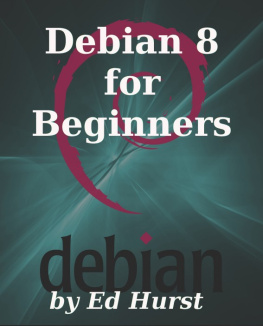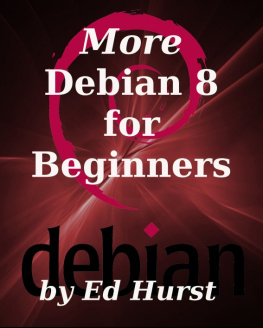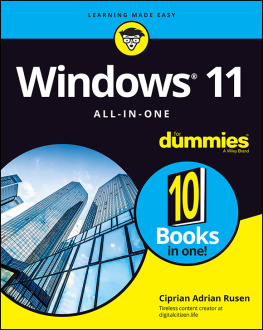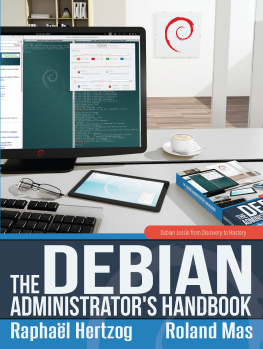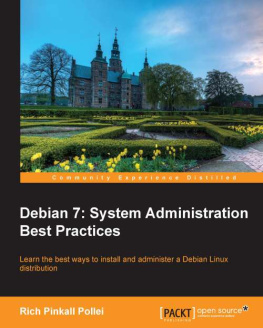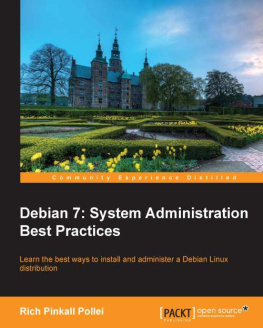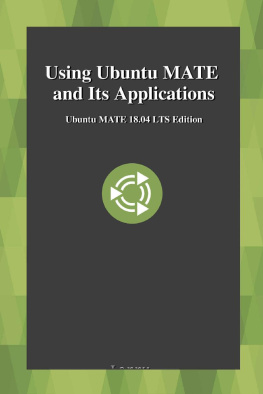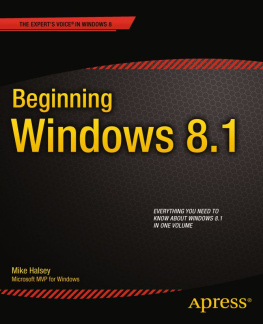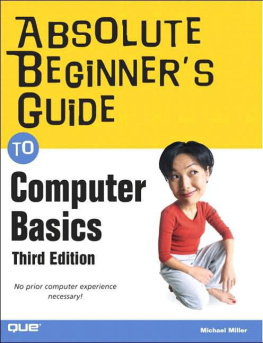Debian 8 for Beginners
By Ed Hurst
Smashwords Edition
Copyright 2015 by Ed Hurst
Copyrightnotice: People of honorneed no copyright laws; they are only too happy to give creditwhere credit is due. Others will ignore copyright laws wheneverthey please. If you are of the latter, please note what Moses saidabout dishonorable behavior be sure your sin will find you out(Numbers 32:23)
Permission is granted to copy, reproduce anddistribute for non-commercial reasons, provided the book remains inits original form.
Cover Art: Paste up of Open Source andPublic Domain art, created by the author using GIMP on a Debiancomputer. Background image is Public Domain ( source ).Debian art logo is licensed under Creative Commons 3.0; source . Cover art fallsunder CC 3.0 and is freely available upon request in several electronic formats,including a version without the text.
Other books by this author include CentOS:The Commercial Grade Linux Desktop and The Shortest Path toLinux.
Debian 8for Beginners
This book is an update from the previousversion, titled Debian: Try It, Youll Like It
This book is aimed at the great average middleof computer users, proficient but by no means a technician.
There are billions of computers in this worldand it seems most of humanity has encountered at least one. Theyhave become nearly ubiquitous and virtually necessary for much ofwhat humans do. We can expect them to become even more important inthe near future. When operating on this scale, we cant avoidthinking in broad generalities.
Most computers run some version of Windows, theoperating system developed by Microsoft. They are easily one of themost powerful commercial influences on the earth. Nothing here ismeant to imply Microsoft is particularly evil, but they dontnecessarily operate in your best interests. We also do not suggestWindows is inferior, but the priorities for its design do not putthe user first. With Microsoft, the software is not the product.You as the user are the product delivered to their corporatepartners for marketing and other forms of manipulation for profit.System security is a priority, but that unfortunately means alsosecure against your prying into the technology. They certain do notgive you maximum control over the system. Microsoft secures Windowsagainst attacks on their profit margin. That is how it works withcommercial software.
In the minds of most people, Apple is the secondbiggest, but they supply both the hardware and the operating systemtogether. Its different in many ways from Windows; it isadvertised differently and sold to a different audience. Its byfar the most expensive option. Their attempts to control andconstrain the user are even tighter than you experience withMicrosoft, though it is easier to poke around in the innards if youfirst learn about Unix, from whence it was born.
And then theres everything else. Most likelyyouve at least heard of something called Linux. In terms ofnumerical presence, its easily far back in third place. It belongsto a much larger type of software development called Open Source.The underlying code is wide open to anyone interested and able toparticipate in writing it. Anyone can change it to suit himself.Granted, when you take away the profit motive, whats left is notnecessarily any friendlier to the common user who cant understandthe code, much less write his own. Most Open Source developers arein it for themselves, in that sense. They are scratching their ownpersonal itch for the most part, and you may not like the results.Fortunately, a large number of developers do take some interest inthe users experience and make room for some of the more commonoptions users like to see.
So maybe you are stuck with some aging WindowsXP machine, which hasnt been supported with security updates in atleast a year. But the hardware still works fine. Can you afford anew machine? Can you afford the next new version of Windows? Couldyour machine run it if you bought it?
You are not stuck with that. You dont have tosurrender to the profit-driven upgrade cycle. You can still useyour computer and keep it secure and gain a measure ofcontrol you could not otherwise have. The answer is replacingWindows with Linux; it also runs on Macs, so you can keep using theApple hardware that no longer runs the current version. Its quitepossible the average computer user can learn to install and runDebian with at least as much savvy as you ran Windows. You donthave to become a computer technician to understand it; its notthat hard.
This whole book was written on a Debiancomputer.
Starting the chapter count with zero is sort ofan inside joke for computer geeks, particularly among thoseinvolved in Linux. A typical list of things starts with zero. Itsa metaphor for starting with a clean slate and getting it right,taking control of the results. Switching to Linux doesnt merelyput you in charge of things; it grants a sense of power you wonteasily get from Windows or Mac. But its really about the peopleinvolved and the computer subculture of DIY.
The primary reason Linux computers seldom getviruses is the Linux user culture. There is a powerful sense oftaking computer security seriously. Just the introductory readingsfor guidance in migrating computers to Linux will teach youconstructive paranoia. You wont get this from Windows users unlessyou go looking for it, but in Linux it is the first assumption ofthe entire user community. You do get a different kind of paranoiafrom using Windows, with all the alerts and anti-virus,anti-malware, etc. However, the big difference is that, withWindows, you know you are helpless, in the sense you will everremain dependent on others.
In Linux land, you are only as dependent as youwant to be. Real experts in Windows have a reflex to keep theirinformation out of public view. Aside from how expensive it is toget that information, too many of the Windows security forums areterribly elitist in the peculiar sense of, We know whats best andwe will tell you what we want you to know. Linux communities arenot at all like that. Plenty of Linux users dont have a clue, butthose who do will gladly explain way more than you care to learn.Getting that from a Windows expert is so rare that, when you do getit, you tend to grab that information and save a copy of itsomewhere. The places where they post such information often fliesunder the radar. Linux information is paraded in the streets andbegs for attention.
You dont have to become an expert to run Linux,but its actually difficult to avoid a higher level of expertiseuncommon among Windows users. This is partly the dynamic of thesort of people drawn to Linux in the first place. They are lookingfor something they cant get with Windows and part of that searchis often hunting for open access to expertise.
Yes, there are precious few viruses and malwarethat run on Linux computers. Some major portion of those few aremere proof-of-concept written by researchers. Most of them requirethe kind of clueless user behavior more common among Windows usersand wholly uncommon among Linux users. Ever hear of Android, thesmartphone OS? Its based on Linux but tries hard to keep usersstupid, so it gets plenty of malware. Almost no desktop version ofLinux does that. Besides, its the cellphone functions of Androidthat open so darn many doors to malware in the first place,functions you wont find in any other type of Linux. Android istypically not considered Linux in the minds of most people becauseit has such a highly specialized use. Every other use of Linuxtends to be secure.
Indeed, Linux servers get more attacksthan Linux desktops. Again, thats because the single greatestlikelihood of idiocy is a server admin who runs the simplest andmost easily cracked software available for their Linux server. Theyuse a Linux server because the OS is free and/or they believe itssecure, but then dump some goofy, trendy server junk on top of it.Worse, as non-participants in the Linux user culture, they have noclue how to perform the most basic security checks and chores. Atruly large percentage of the Internet runs on good, secure Linuxservers controlled by well-trained server administrators.

